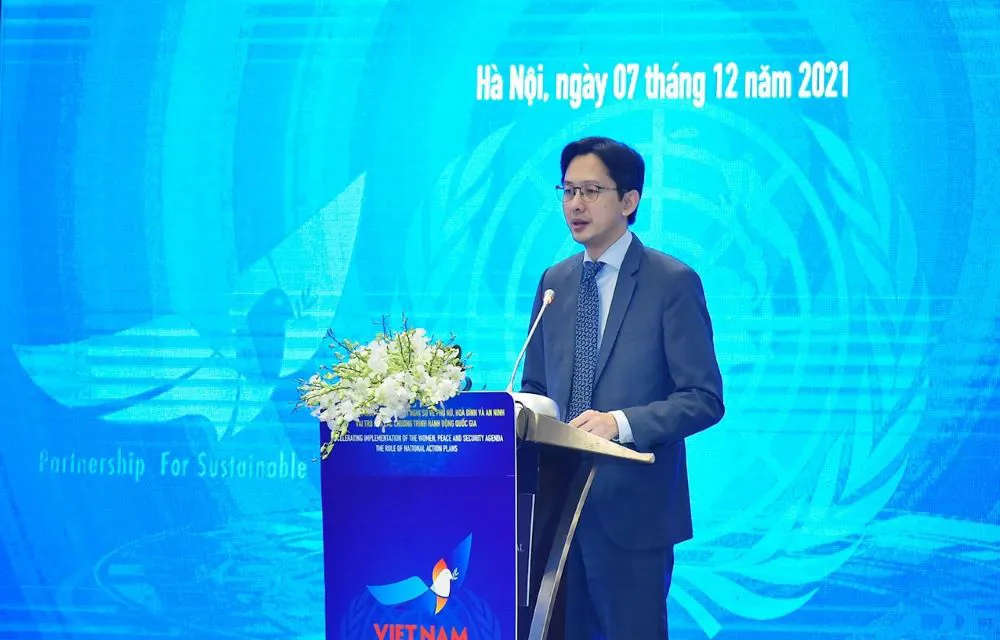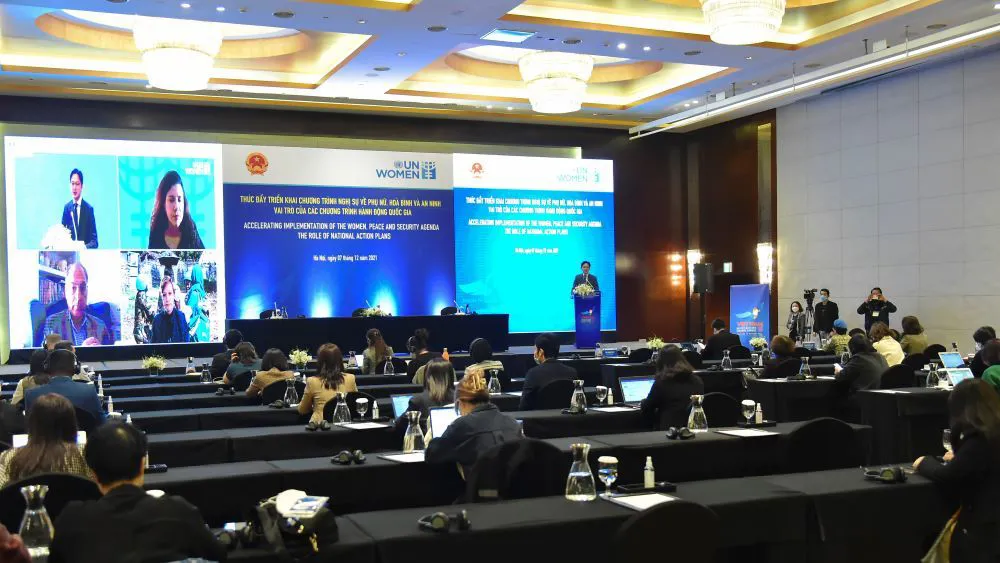Vietnam joins efforts to empower women in global peace
Vietnam said the UN member states should have proper national action plans to realize its international commitments on women empowerment.
An international workshop held on December 7 in Hanoi to discuss promising practices on the implementation of women, peace and security (WPS) is part of Vietnam’s efforts to boost the issue at both national and global levels.
| Do Hung Viet, assistant to Vietnam’s Foreign Minister, speaks at the event in Hanoi on Dec 7. Photo: MoFA |
Political leaders, representatives of UN Agencies in Viet Nam, socio-political and women’s organizations, and Vietnamese academia gathered for “Accelerating the Implementation of the Women, Peace and Security (WPS) Agenda: The Role of National Action Plans (NAP)” in the event hosted by the Ministry of Foreign Affairs of Viet Nam, in partnership with UN Women.
Addressing the event, Do Hung Viet, assistant to Vietnam’s Foreign Minister, affirmed that the United Nations members should pay more attention to mechanisms and tools to implement WPS Agenda, including the role of National Action Plans.
He said Vietnam has provided initiatives on empowering women and promoting their engagement in international agendas.
The workshop covered a variety of topics namely accelerating the implementation of the WPS Agenda; the role of the WPS NAP; raising awareness on the importance of a NAP on WPS; presenting available models of NAPs and best practices of NAP implementation from across the globe; and the common challenges for the development and implementation of a NAP.
The workshop was an open space for the sharing of many WPS NAPs, and for key stakeholders to question the effectiveness, efficiency, and challenges of each NAP, including how the NAPs are aligned with national development strategies, how they are financed, and how they are in support to women empowerment agenda across sectors.
It also addressed how they promote inclusive and participatory inter-ministerial coordination, how they are a way for the government to realize its international commitments, and how they are able to support the government to respond swiftly in times of crisis, like the Covid-19 pandemic, to protect women and girls from additional harm.
All of these will come together with the common goal of paving the way for the possible development of a NAP, or a similarly effective and efficient WPS framework for Vietnam.
The first International Conference on Women, Peace and Security (WPS) themed “Strengthening Women’s Role in Building and Sustaining Peace: From Commitments to Results” was organized in Ha Noi in December 2020 marked international efforts in the common drive.
In December 2020, the WPS agenda was re-enforced by the Ha Noi Commitment to Action, which was endorsed by 75 countries, and launched on the 20th anniversary of UNSCR 1325 through the global WPS Workshop hosted by Viet Nam.
To strengthen the implementation of the WPS agenda, UN Member States have formulated and adopted NAPs on WPS. The WPS NAPs illustrate how UN Member States prioritize different aspects of the WPS agenda according to their national settings, and provide information on how the WPS activities are governed, funded, and monitored. They are national-level strategy documents that outline a government’s approach and course of action for localizing the WPS Agenda.
| Overview of the event. Photo: UN Women |
Necessity
Inequality is a key driver of social unrest and conflict. Peace and security for all can only be achieved and sustained if peace and security for women and girls is guaranteed. In 2021, the Covid-19 pandemic has tested governments, women, and other peacebuilders. It has added yet another layer of risk and complexity to conflicta and further widened inequalities and threatened to undermine human rights.
Using the comprehensive WPS Agenda approach of prevention, protection, participation, relief and recovery, and frameworks like that of a National Action Plan is useful for all States in the consideration of sustaining peace and to further develop the country.
Additionally, the factors aid countries in the achievement of the Sustainable Development Goals and enable nations to fulfill other international commitments to gender equality and the promotion of women and girls’ equal access to social, economic, business and professional opportunities, access to resources and services, and agency in decision-making processes.
Affirming the important role of women in the prevention and resolution of conflict and peacebuilding, the WPS agenda was first formalized by the UN Security Council Resolution 1325 (2000), with the subsequent Resolution 9, and provides a holistic approach to peacebuilding and security through four pillars - Prevention, Participation, Protection, and Relief and Recovery – with respect to the human rights and dignity of women and girls and in tackling the root causes of conflict to create sustainable peace.













